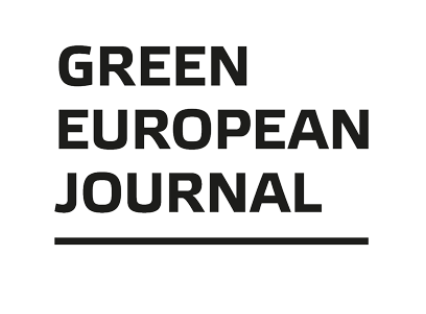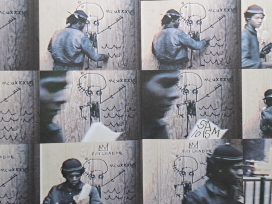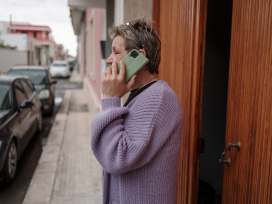Water: From scarcity to equity
Conventional market-led solutions to water scarcity in the Arab Mediterranean, above all mega-projects such as dams, support state agendas and reinforce inequalities in access. Water wars are not inevitable but the result of bad management.
Conventional market-led solutions to water scarcity in the Arab Mediterranean, above all mega projects such as dams, have tended to support state agendas and reinforce inequalities in access. Water wars are not inevitable but the result of bad management.
More than 3.5 billion people around the world live in areas facing water scarcity. This figure is set to increase to 5 billion by 2050, as climate change favours extreme phenomena such as floods and droughts. More than half of the planet’s inhabitants will thus experience the results of competition for water first hand.
The most recent reports from the International Panel on Climate Change confirm these dramatic trends, noting the impact of climate change on terrestrial ecosystems, water infrastructure, food production and urban settlements. Some regions and sub-regions deserve particular attention: the Mediterranean space, for instance, is expected to suffer the most disastrous consequences along with small island states and parts of the African continent. These areas are not only highly exposed to climate change and water scarcity, but also to new economic challenges that are unprecedented in human history.
The Mediterranean region is the most water-scarce in the world, with the Arab countries particularly affected. Climate change compounds the effects of the already limited rainfall in this arid or semi-arid area. Population growth, including migration flows from rural to urban areas, further increases the demand for water resources. Communities already affected by water scarcity must prepare for increasingly devastating consequences in the short term.
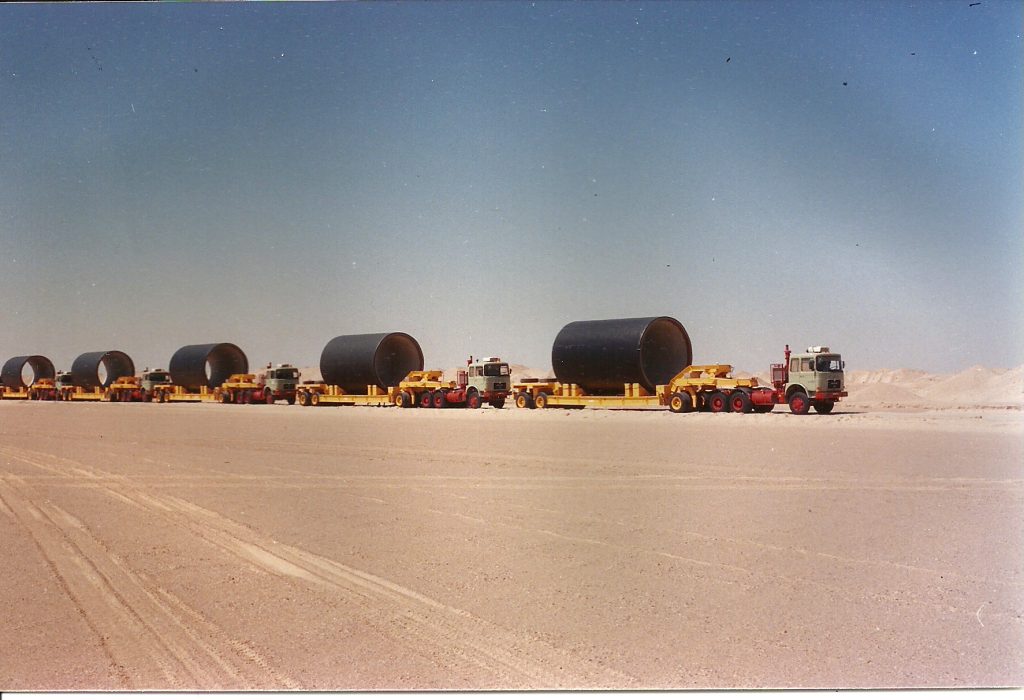
Irrigation pipeline Libya. Image: Jaap Berk / Source: Wikimedia Commons
But water scarcity also has structural and institutional causes, namely poor management and a lack of sustainable water policies. Water management has long been at the centre of discourse and practice of NGOs and international organisations working in the field of development cooperation. This reflects the historical significance of the agricultural sector in political, economic, environmental and technological transformation, and the vital role played by water resources in this sector.
Since the 1950s, water management has encouraged technocratic approaches such as the construction of dams and national food self-sufficiency, which are seen as concrete solutions to the problem of water scarcity. This has led not only to the expansion of specific agricultural production models, but also to the consolidation of disparities and inequalities in access to and use of these resources. If current water resource management models continue to prevail in conjunction with increasing demand and unsustainable policies, there will not be enough water for everyone in the Mediterranean region.
Water wars?
Since the 1990s, we have heard of impending ‘water wars’, or of water becoming the ‘oil of the 21st century’. Boutrous Boutros-Ghali, the UN Secretary-General from 1992 to 1996, once said that ‘the next war in the Middle East will be fought over water, not politics.’ King Hussein of Jordan identified water as the sole factor that could lead his country to war with Israel.1
The media often portray water scarcity as the main driver of wars in semi-arid regions such as the Middle East, warning that such conflicts could also arise in the Mediterranean region. According to this line of argument, water is a question of national security. With demand exceeding supply, competition for transboundary water resources becomes a potential cause of armed conflicts.
This kind of narrative posits a deterministic link between water scarcity and population growth. Over two centuries ago, Thomas Malthus argued that food production would not be sufficient to meet the needs of a growing population, leading to famine and deaths. Today, neo‑Malthusians promote the idea of inevitable water wars, linking them to the new threat of climate change.
They overlook that all natural resources are finite, and therefore by definition limited. In 1972 the Club of Rome emphasised absolute scarcity and the environmental limits to growth. Earth has finite physical resources to support the needs of human society, the report’s authors pointed out; if these thresholds are exceeded, the global system collapses.
Overall, The Limits to Growth underscored the need to reduce demand and consumption – an approach that is more important than ever in a society driven by abundance and the creation of ever new needs. The more recent concepts of the Anthropocene and planetary boundaries also stem from the belief that exponential growth and human activities themselves are exerting further pressure on the Earth system, and that this could cause irreversible changes to the climate and the environment, with catastrophic consequences.
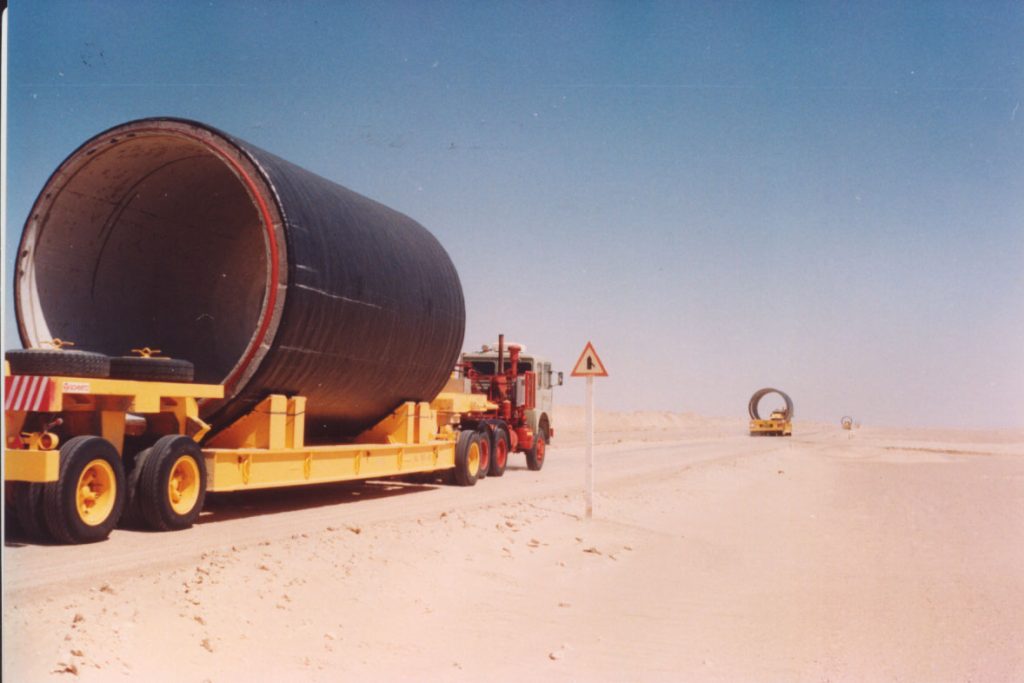
Irrigation pipeline Libya. Image: Jaap Berk / Source: Wikimedia Commons
But some scientists have deemed the water wars discourse unfounded hyperbole and pointed out that the empirical evidence connecting water scarcity and armed conflicts between states is not clear. They stress that the ‘water wars’ theory has led to misleading conclusions based more on speculation than robust analysis. Tony Allan, for example, has developed the concept of ‘virtual water’, to quantify the water required to produce any good or service, starting with food. According to this model, importing a kilogram of cereals entails importing the corresponding amount of water used to produce it. With the concept of virtual water trade, Allan explains why there have been no water wars in the Middle East. In other words: food security need not mean food self-sufficiency.
Researchers at the International Peace Research Institute have also shown that the water wars discourse lacks empirical foundations and fails to consider other variables. For example, in the Senegal River conflict, ethnicity and class were more important factors than natural resources. In several Middle Eastern countries, general poverty is the primary reason for conflict, not water scarcity.2 This suggests that there is a stronger correlation between conflict and underdevelopment than between conflict and water scarcity (or natural resources more broadly).
Some scholars have argued that water scarcity can even be an opportunity for peace. Aaron Wolf, for example, has analysed transboundary water interactions over the past half-century, finding many cases of cooperation but no cases of wars over water.3 More recent critical literature on hydropolitics argues that cooperation is not always positive: treaties can codify an asymmetric status quo and themselves become a source of conflict. The nuances of conflict and cooperation vary: there are degrees of both, the critics of the cooperation model point out.4
The literature examining the politics of scarcity challenges neo-Malthusianism and its assumptions by analysing how scarcity is conceptualised. It emphasises that water scarcity is often used to support state political agendas, and that mega‑projects such as dams reinforce power asymmetries in water management and silence discussion of alternative solutions to water scarcity. Dominant market-oriented engineering solutions, argue critics, neglect the question of who has access to how much water and why. In the West Bank, for example, water scarcity is a matter of structural discrimination against Palestinians, and of privileged access for illegal Israeli settlements. A similar situation exists in India, where access to some wells is denied to lower-caste women. In Apartheid-era South Africa, inequalities driven by discriminatory policies extended to the water sector.
Critics of the water scarcity paradigm therefore focus the attention towards who primarily benefits from traditional solutions and who is excluded. They argue that the major beneficiaries are private interests and the dominant class while, in the absence of redistributive mechanisms, the poor are further marginalised. Solutions, they propose, should involve dismantling the institutional barriers that cause discrimination and inequality. Lyla Mehta, for example, argues that scarcity is an indicator of a crisis of unequal power relations and that water crises ‘must also be seen as crises of distorted access and control over a finite resource’.5 Moreover, as a hegemonic framework, scarcity is presented as a singular phenomenon. This results in an approach that overlooks regional differences or cyclical variations over time. This critique emphasises the need to investigate issues of access and equity rather than simply quantities and the balance between supply and demand.
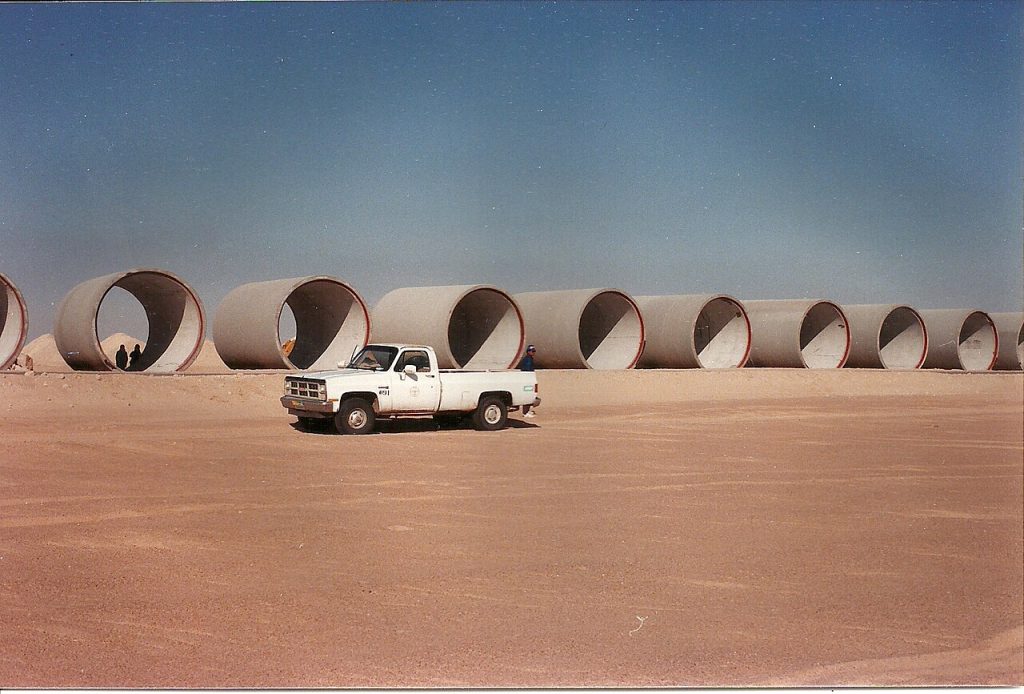
Irrigation pipeline Libya. Image: Jaap Berk / Source: Wikimedia Commons
Water diplomacy
The scarcity of natural resources arises as much from human interactions and policy decisions as from inherent limitations. It is determined not just by the mass and availability of natural resources, but also by individual access to them, which is determined by political economy, institutional agreements and regional management. These arrangements influence the actions of formal and informal institutions to alleviate scarcity. Solutions tend to add more water resources to the system through the construction of new supply infrastructure, without analysing the ecology or socioeconomics of the region, or existing supply and infrastructure.
The result is that while the overall water supply in the system may increase, access reproduces existing conditions and fails to ensure more adequate and equitable distribution among the population. This is why policies in the Mediterranean region should be based on sustainable solutions, better management and fairer distribution of water resources among countries and populations.
At the regional level, the adoption of ‘water diplomacy’ practices would be useful in reducing potential conflictual relations among countries sharing transboundary water resources, such as the Nile, Tigris and Euphrates, and the Jordan. The shared nature of transboundary water resources can lead to tensions over their allocation and use, which can in turn negatively impact inter-state relations and cooperation. Most freshwater resource systems cross jurisdictional boundaries, with 153 countries sharing transboundary rivers, lakes and aquifers. Coordinated and sustainable management of these resources through water diplomacy is therefore crucial.
The concept of water diplomacy emerged in the early 1990s. Its emphasis is less on the technical aspect of water governance than on its political aspects and implications for security, peace and stability.6 Water diplomacy brings governments together primarily to discuss the benefits and services derived from the use of water, rather than the actual allocation of resources. Thus, while one country may be allocated more water, another may receive more hydroelectric power or food production in return. This type of diplomacy can have a broad range of applications and may lead to regional cooperation, peace, and stability. Its effectiveness depends on five critical elements: agreed-upon data, an effective governance structure, participatory and inclusive approaches, third-party support, and ecological considerations.
A consolidated and reciprocal understanding of data ensures that all agreements and treaties are based on accurate and solid evidence. Effective governance structures establish communication channels between riparian states for the collective implementation and maintenance of agreements. Participatory and inclusive approaches and stakeholder involvement enable agreements that respond to local needs and benefit from local participation. Third-party support can facilitate dialogue, capacity building and monitoring, which helps riparian states maximise mutual benefits. Finally, attention to ecological factors ensures the sustainability of water management and can lead to mutually beneficial outcomes.
When it comes to water resources, it is necessary to implement public policies that address growing challenges while simultaneously aiming to ensure fair distribution. Instead of purely technical projects, such as dam construction, we need a creative approach capable of addressing the increasing demands for water from various sectors and sub-regions. We must initiate new discussions about water scarcity, so as to stimulate reflection on methods of water management under increasingly precarious conditions.
Adopting new approaches to water scarcity in the Mediterranean means weighing the pros and cons of any methods used to ensure food security, given that the agricultural sector is the largest water consumer in most countries in the region. All of this will have implications for rural development. New jobs will need to be created while ensuring safe and stable food imports. The complexity of the challenge calls for a complete paradigm shift, not only to ensure water security, but also to prevent conflicts in many other areas.
Janos J. Bogardi et al. (eds), Handbook of water resources management: Discourses, concepts and examples, Springer 2021, 186.
N.P. Gleditsch, K. Furlong, H. Hegre, B. Lacina, and T. Owen, ‘Conflicts Over Shared Rivers: Resource Scarcity or Fuzzy Boundaries?’, Political Geography, vol. 25, no. 4/2006.
A.T. Wolf, A. Kramer, A. Carius, and G.D. Dabelko, ‘Water Can Be a Pathway to Peace, not War’, Navigating Peace, No. 1/2006.; A.T. Wolf, ‘The Transboundary Freshwater Dispute Database Project’, Water International, Vol. 24, No. 2/1999).
See M. Zeitoun and N. Mirumachi, ‘Transboundary Water Interaction I: Reconsidering Conflict and Cooperation’, International Environmental Agreements: Politics, Law and Economics, No. 8/2008).
L. Mehta, The Limits to Scarcity: Contesting the Politics of Allocation, Routledge 2013.
Hussein, H., Campbell, Z., Leather, J., & Ryce, P., Putting diplomacy at the forefront of Water Diplomacy. PLoS Water, 2(9), e0000173, (2023).
Published 29 November 2023
Original in Italian
Translated by
Ciaran Lawless, Voxeurop
First published by Il Mulino 3/2023 (Italian version); Eurozine (English version)
Contributed by Il Mulino © Hussam Hussein / Il Mulino / Eurozine
PDF/PRINTPublished in
In collaboration with
In focal points
Newsletter
Subscribe to know what’s worth thinking about.
Related Articles

The challenge of inequality
il Mulino 1/2023
On inequality and the Left: why coalition politics favours social democratic solutions; how a left revival hinges on inclusive growth; and whether the root problem may not be inequality but the weak state.

Steady access to safe, drinkable water is still a privilege, and Europe is struggling with ever-worsening droughts. The new episode of the Standard Time talk show discusses chemical hazards, eco guerrillas, and why we can never have enough pelicans.
